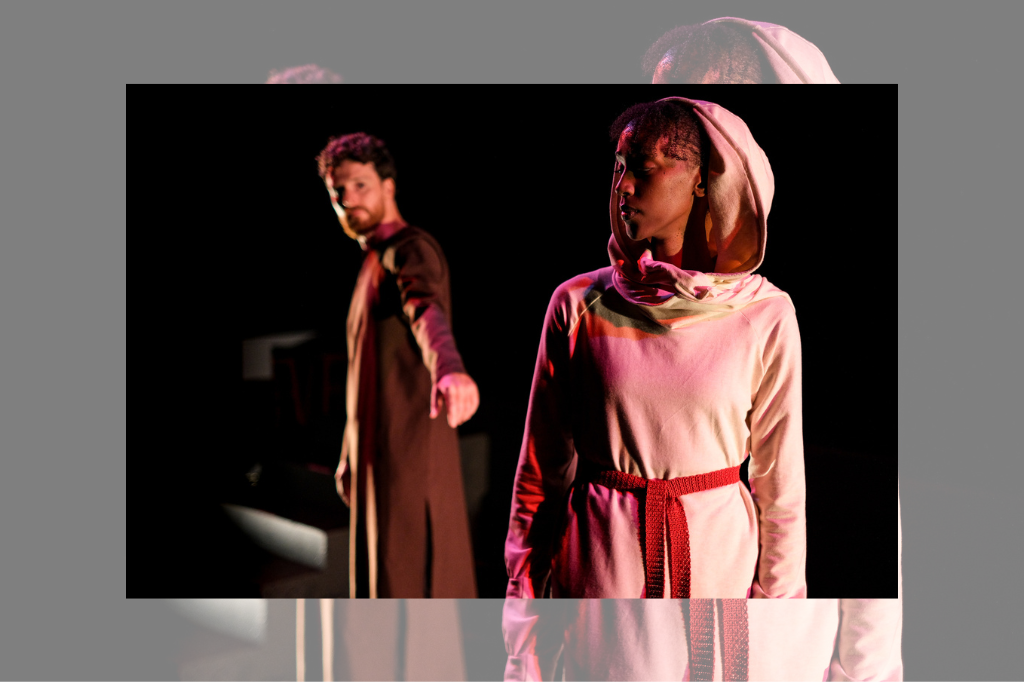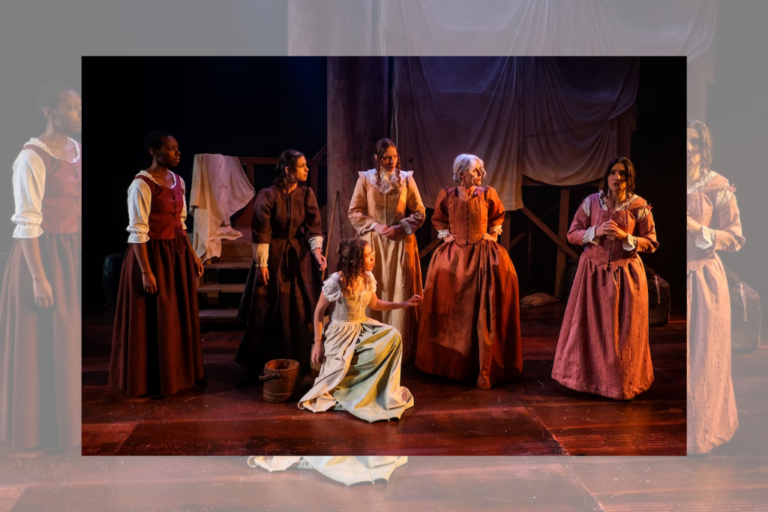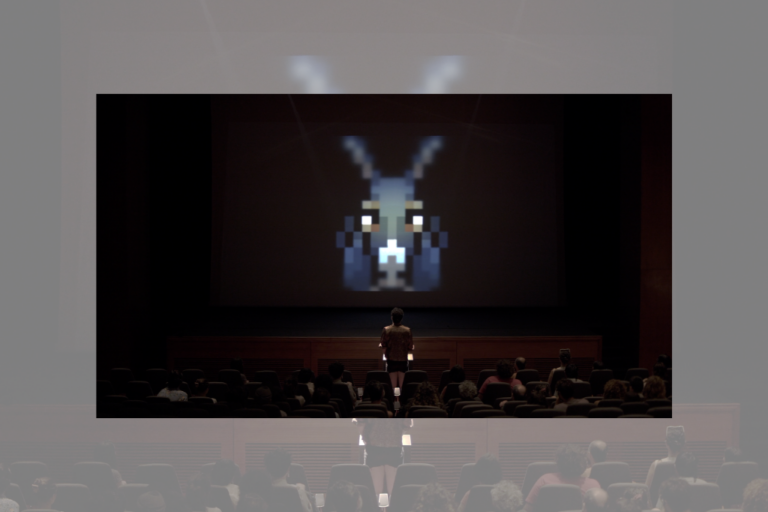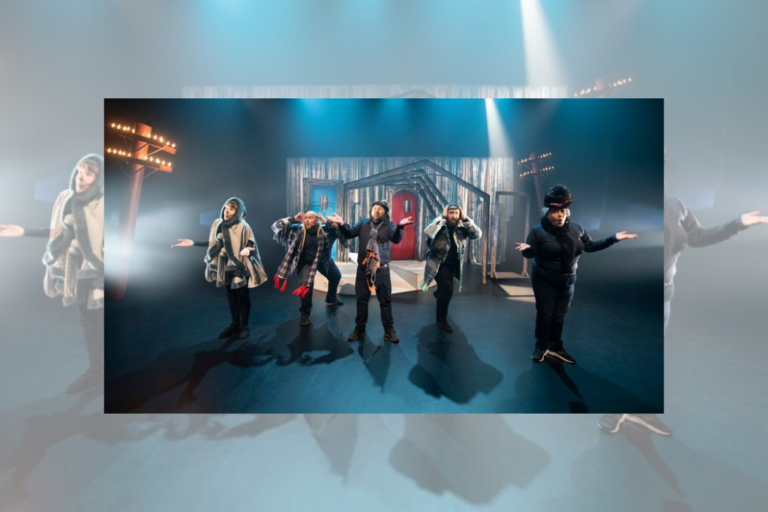REVIEW: Convictions thoughtfully explores myth in the modern world
In her introduction to the premiere of Convictions — a new play at the Berkeley Street Theatre produced by Théâtre français de Toronto, written by Lara Arabian and directed by Djennie Laguerre — TFT artistic director, Karine Ricard, stood behind a set piece draped with an emblem of the Catholic cross. Partway through her land acknowledgement, she noted the irony of the setup, and asked us to accept the paradox.
Convictions is all about accepting paradoxes: can religion be a source of both repression and freedom? Can a similarity between mother and daughter be what drives them apart? And when 13-year-old Zara (played by Sheila Ingabire-Isaro) starts hearing a voice in her head, can it be both real and imagined?
Arabian’s text deftly walks these lines, building a complex picture of a Lebanese-Canadian family caught between the old world and the new. When Michel (Nabil Traboulsi) and Sylvie (Arabian) both emigrated to Canada to escape the Lebanese civil war, Sylvie’s family found solace in their community’s All Saints Church, where immigrants from many places gathered. Michel, frustrated by the bloody conflict religion creates (and the conformity it demands), became a staunch atheist, banning any religious talk in his home.
But their daughter, Zara, begins to hear a voice in her head, one she eventually identifies as belonging to the daughter of Jephté (French for Jephthah), the Biblical figure sacrificed by her father in return for his victory in battle. The daughter of Jephté asks Zara to find her a name, since the Bible fails to give her one. Convictions is in line with other modern texts (particularly by feminist authors) that aim to pluck female figures from the margins of history and literature and give them subjectivity. But it also explores the Joan of Arc trope of a woman who is persecuted for her claims of a connection to the divine. Arabian leaves the speculation on the cause of these voices to the audience (is the voice a genuine revelation, a symptom of mental illness, or a stress-induced fantasy?), and instead focuses on how the world around Zara reacts to it.
Initially horrified by his daughter’s revelations, Michel (an unemployed social media manager) soon realizes he can turn her experience into online engagement, putting her in the range of strangers’ hate. In this very contemporary context, the family plays the ancient story of a daughter sacrificed for her father’s success while the mother is unable to interfere. Through Arabian’s text and performance, the mother’s powerlessness is given powerful depth. In her desire to protect her daughter, there is also a desperation to keep up appearances, and the trauma of immigration has left her unable to move forward and longing for the safety of tradition.
Convictions was made with (as Ricard notes in her introduction) quite limited resources. It was initially an audio play produced by TFT at the height of the pandemic in 2021, then adapted into a stage play presented at Berkeley Street Theatre and Zébrures d’automne festival in Limoges, France this September. Ricard noted that the show was fast-tracked, and indeed, there is a rough-around-the-edges quality to the production that sometimes hampers the sophistication of the text and the sincerity of the performances.
Moody sound and lighting design (by Armen Bazarian and Sebastian Marziali respectively) cleverly evoke the play’s disparate locations, both real and imagined. But there’s a slight lack of coherence in the staging that occasionally leaves the actors looking stranded. And the rhythm of the show is impaired by the constant moving of a tricked-out kitchen island — it serves as a desk, dining table, pulpit, and TV — across the stage. When Michel is at “work,” he lifts the top of the island to make a standing desk. It’s an apt image for our contemporary work lives (anyone who has set foot in an office in the last five years has noticed the proliferation of Vari desks), but it’s also an unnecessary added maneuver for the actor, since the only work he does at the “desk” is making phone calls. The pandemic thoroughly incorporated our work lives into our home lives, and we no longer need a desk to be at work.
Despite this, Arabian and TFT have created a provocative, timely new work that intelligently explores the contradictions of immigration, family, and faith. Convictions brings the mythic into the contemporary world, reminding us that we are deeply connected to those who came before us, even distantly, through the stories we keep silent and the ones we are brave enough to tell.
Convictions runs at the Berkeley Street Theatre until October 1. Tickets are available here.
Intermission reviews are independent and unrelated to Intermission’s partnered content. Learn more about Intermission’s partnership model here.















Comments